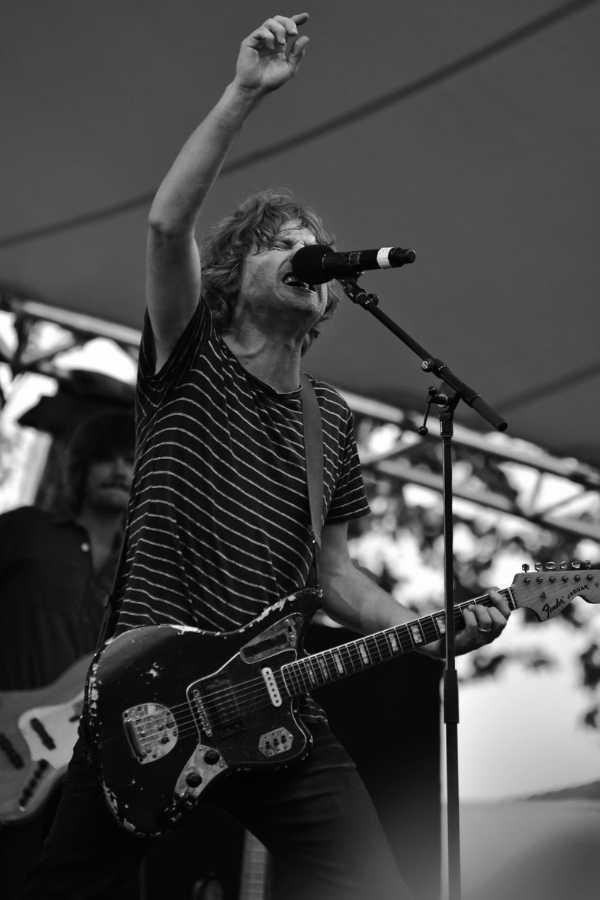Jim Morrison, Amy Winehouse, Jimi Hendrix, Kurt Cobain, Janis Joplin. Some of the greatest names of rock and roll to ever have graced our stages and ears.
Despite being some of the most influential songwriters of all time, there is another thing this gifted, yet troubled group of singer-songwriters have in common and that is being forever immortalised in the enigma which is the '27 Club'.
The tragic tale which follows these names is a hypothesis which has been trialed over the years by many scientists and skeptics alike. One of both mystery and possible coincidence with a story extending back to Robert Johnson, one of the blues’ most influential talents who passed in August of 1938, just a few months after his 27th birthday. Having recorded songs such as ‘Cross Road Blues’, ‘Hell Hound On My Trail’, ‘If I Had Possession Over Judgement Day’ and ‘Last Fair Deal Gone Down’, it leaves us wondering what that deal really was. . . And who it was with. Winston Howard opened the show with a chilling acoustic performance of some of Johnson’s dissonant delta blues numbers on an old vintage couch setting, side of stage, as if we were taken back in time, watching the man himself at work down the juke joint at the rural crossroads down in ‘ole Mississippi.

Image © Damien Steele Scott
Jimi Hendrix, Alan Wilson (guitarist from Canned Heat) and Janis Joplin were some of the biggest acts at Woodstock in 1969. The most significant music festival in history which served as an escape from the Vietnam War and ongoing unrest of the civil rights movement. A chance for people in protest to spread a message of unity and peace, leaving it out of mind; out of sight and the music of this time reflected that. The show took off with Dusty-Lee Stephensen (Wanderers) giving us a taste of Woodstock with Hendrix’s 'Voodoo Chile' which features saucy slow blues vocals with twangy trill-like licks, responding and moving into psychedelic pedal prints in the guitar and smashing hammond organ calling out in the echo of the background. Sarah McLeod (Superjesus) performed an electrifying rendition of Janis Joplin’s, ‘Cry Baby’. Souring, raw vox-chords captured the essence of this unique blues mistress. On other nights, this was performed by Zkye Compson-Harris and without taking a single thing away from the spectacular performance Sarah gave, having heard Zkye perform Janis before at the blues clubs (Memphis Slims on a Thursday 8pm until late is the blues jam night Dusty runs weekly), I can genuinely say the audience was in for a treat with both of these extraordinary Adelaide-based femme powerhouses on any given night.
The next major death to follow was that of ‘American Poet’, Jim Morrison. Throughout the show, the musicians spoke to the crowd as pianist, Jack Strempel (Eraser Description, Wanderers) performed interludes of ‘Riders Of The Storm’ alongside bassist Milush Piochaud (Wanderers, Billy Bob’s BBQ Jam), guitarist Cameron Blokland (Southern Empire, Max Cruise, The Superjesus) and drummer Danny Leo. A storybook surrounding each artist with some historical facts and the way they personally see, feel and have experienced their music.
It wasn’t until the untimely death of Kurt Cobain in 1994 this elusive theory of the devil paying his dues really began to come into question. One of the highlights of the show was Carla Lippis (Mondo Psycho) returning to the stage after some exuberant upbeat performances of Amy Winehouse with an eerily stunning rendition of a stripped back ‘Lithium’. Her vocals echoed through the Fantail open-air venue while the audience was mesmerised, taken into the darkest depths of Cobain’s depression which ultimately resulted in his demise. We witnessed Nirvana in the glory days with Kevin Mitchell (Jebediah, Bob Evans) bringing those smashing, grungy performances the band is known for with ‘Smells Like Teen Spirit’ and ‘Come As You Are’. Kevin brought himself to the floor in true rock n’ roll style as we listened to the strong, natural influence in his voice and pedal parts with strumming techniques.

Image © Damien Steele Scott
They tried to make Amy Winehouse go to rehab and she said “no, no, no”. As the artists before her, come July 2011, her body was taken by substance abuse, alcohol and addiction, struggling with the price of fame in the industry, she went ‘Back To Black’. The audience jumped up to dance along to a melody led by arguably her most famous song, 'Valerie' at the conclusion of the show in a sensational display of character combined after the stories have unfolded, including one mighty drum display by Danny and a sweet mix of guitar medleys in standing power formation over folded back on the edge of the stage by Cam and Dusty.
Having been blessed enough to perform dead artists with Dusty (has a ring to it) myself, I know first-hand the connection and pure heart which goes into putting on a production like this and the attention to detail in capturing these songs and artists in the most authentic way. For this reason, I also know this extremely talented bunch of living musicians living in Adelaide (yes, this little home town the Fringe takes place in) won’t mind I’ve turned their performance review into a music history lesson, because when the show is over (and for this year, it is, but it will be back bigger and better next year), this is the message they want their audiences to take from it.
All being songwriters in their own right, each one of these artists, including the phenomenal backing band, have drawn inspiration from these genius tortured artists and many more, while building themselves up on those sounds they connect to so they can create more new, original music for us to enjoy.

Image © Damien Steele Scott
I encourage you to please check out some of the live performances they have in and around town and over Australia throughout the year. In these spine-tingling, very original covers, they push themselves aside as they become the facilitators and a channel for the spirit in what has become a tale of mortality, reminding us how fragile the impact of who we are as artists and human as one can really be.
We understand these types of articles and shows may be triggering for some and along with the musicians of the 27 Club band themselves, scenestr would like to write a short disclaimer for anyone struggling with addiction and/or substance abuse, mental health, eating disorders, domestic violence, financial difficulty or the like to please reach out. You are not alone and it’s something so many face, particularly in the arts industries, and it should be spoken about openly.
Support Act is an Australia-wide charity providing support specifically with crisis in music and the arts. For anyone who may be struggling, please call the hotline on 1800 959 500. It is staffed by trained counsellors 24 hours.

